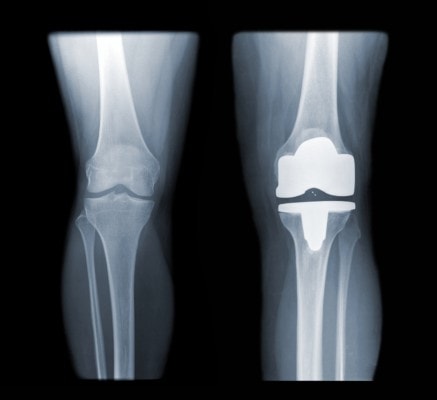Biking after Knee Replacement? New Study Shows Half of Patients Use Pain Medications 1 Year after Surgery

The knee on the right has been replaced. Skyhawk X/Shutterstock
You’ve seen the commercials, happy smiling faces and active people biking after knee replacement.
Do People Take Pain Medication After Knee Replacement Surgery?
Most of the patients I know believe that their knee replacement will be magical. A big surgery yes, but all of their problems will vanish once they recover from that surgery. Regrettably, outside of a few treatment registries, there is little high quality, detailed research about how patients actually function and how much pain they have after knee replacement.
Interestingly, the studies that have tracked detailed descriptions of pain haven’t looked good. For example, a recent study of pain after knee replacement found that the most common 1-10 number given to researchers wasn’t 0/10, but 5/10. Another study looked at the activity of knee replacement patients and disappointingly found that the vast majority of patients didn’t increase their activity after surgery. Now, a new study suggests that pain medication use after knee replacement is widespread.
This new French study looked at almost 2,000 knee replacement patients one year after their surgery. They used a nationalized healthcare system to track the new use of over the counter pain medicine, nerve pain drugs, and narcotics. While we would expect to see very little new use of pain medications in this group of patients, a very surprising 47% of patients began taking new analgesic medications (like Tylenol and Motrin) during the year after their surgery. About 9% needed new nerve drugs and about 6% new narcotic drugs. Younger knee replacement patients and those with more pain before the surgery needed more drugs. This is consistent with other research. For example, one study found that most young patients wore out a partial knee replacement only after about 5 years. In addition, another study found that patients with more severe arthritis had poorer outcomes with knee replacement.
The upshot? As more detailed research is produced that looks at patient pain and function after knee replacement, the data isn’t that encouraging. Most patients believe that getting their painful and arthritic knee replaced with a piece of hardware will dramatically change their lives for the better and commercials of people running, skiing and biking after knee replacement do much to create that expectation . In fact, the new information that half of knee replacement patients start new pain medications in the year after their surgery should be very concerning to anyone considering a knee replacement.

If you have questions or comments about this blog post, please email us at [email protected]
NOTE: This blog post provides general information to help the reader better understand regenerative medicine, musculoskeletal health, and related subjects. All content provided in this blog, website, or any linked materials, including text, graphics, images, patient profiles, outcomes, and information, are not intended and should not be considered or used as a substitute for medical advice, diagnosis, or treatment. Please always consult with a professional and certified healthcare provider to discuss if a treatment is right for you.
